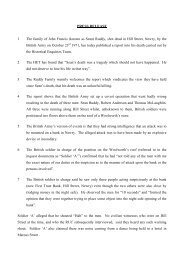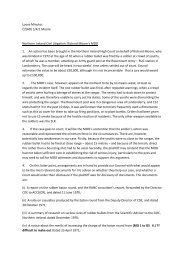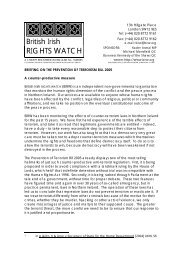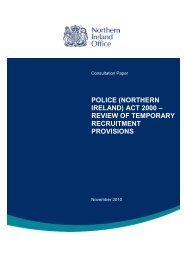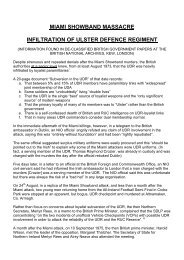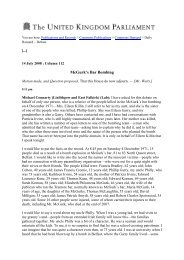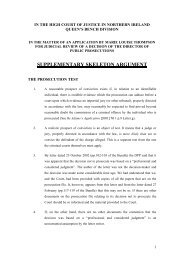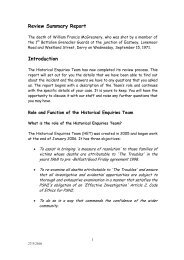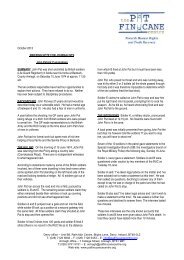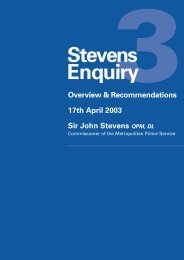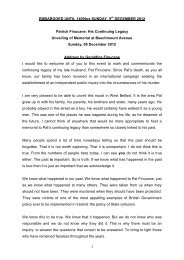Patrick Shanaghan v the United Kingdom - The Pat Finucane Centre
Patrick Shanaghan v the United Kingdom - The Pat Finucane Centre
Patrick Shanaghan v the United Kingdom - The Pat Finucane Centre
You also want an ePaper? Increase the reach of your titles
YUMPU automatically turns print PDFs into web optimized ePapers that Google loves.
24 SHANAGHAN v. THE UNITED KINGDOM JUDGMENT<br />
Complaints and by <strong>the</strong> Director of Public Prosecutions, <strong>the</strong> inquest<br />
proceedings and civil proceedings. <strong>The</strong>se secured <strong>the</strong> fundamental purpose<br />
of <strong>the</strong> procedural obligation, in that <strong>the</strong>y provided for effective<br />
accountability for <strong>the</strong> use of lethal force by State agents. This did not<br />
require that a criminal prosecution be brought but that <strong>the</strong> investigation was<br />
capable of leading to a prosecution, which was <strong>the</strong> case in this application.<br />
<strong>The</strong>y also pointed out that each case had to be judged on its facts since <strong>the</strong><br />
effectiveness of any procedural ingredient may vary with <strong>the</strong> circumstances.<br />
In <strong>the</strong> present case, <strong>the</strong>y submitted that <strong>the</strong> available procedures toge<strong>the</strong>r<br />
provided <strong>the</strong> necessary effectiveness, independence and transparency by<br />
way of safeguards against abuse.<br />
3. <strong>The</strong> Nor<strong>the</strong>rn Ireland Human Rights Commission<br />
84. Referring to relevant international standards concerning <strong>the</strong> right to<br />
life (e.g. <strong>the</strong> Inter-American Court’s case-law and <strong>the</strong> findings of <strong>the</strong> UN<br />
Human Rights Committee), <strong>the</strong> Commission submitted that <strong>the</strong> State had to<br />
carry out an effective official investigation when an agent of <strong>the</strong> State was<br />
involved or implicated in <strong>the</strong> use of lethal force. Internal accountability<br />
procedures had to satisfy <strong>the</strong> standards of effectiveness, independence,<br />
transparency and promptness, and facilitate punitive sanctions. It was<br />
however, in <strong>the</strong>ir view, not sufficient for a State to declare that while certain<br />
mechanisms were inadequate, a number of such mechanisms regarded<br />
cumulatively could provide <strong>the</strong> necessary protection. <strong>The</strong>y submitted that<br />
<strong>the</strong> investigative mechanisms relied on in this case, singly or combined,<br />
failed to do so. <strong>The</strong>y referred, inter alia, to <strong>the</strong> problematic role of <strong>the</strong> RUC<br />
in Nor<strong>the</strong>rn Ireland, <strong>the</strong> allegedly serious deficiencies in <strong>the</strong> mechanisms of<br />
police accountability, <strong>the</strong> limited scope of and delays in inquests, and <strong>the</strong><br />
lack of compellability of <strong>the</strong> members of <strong>the</strong> security forces who have used<br />
lethal force to appear at inquests. <strong>The</strong>y drew <strong>the</strong> Court’s attention to <strong>the</strong><br />
form of enquiry carried out in Scotland under <strong>the</strong> Sheriff, a judge of<br />
criminal and civil jurisdiction, where <strong>the</strong> next-of-kin have a right to appear.<br />
<strong>The</strong>y urged <strong>the</strong> Court to take <strong>the</strong> opportunity to give precise guidance as to<br />
<strong>the</strong> form which investigations into <strong>the</strong> use of lethal force by State agents<br />
should take.<br />
B. <strong>The</strong> Court’s assessment<br />
1. General principles<br />
85. Article 2, which safeguards <strong>the</strong> right to life and sets out <strong>the</strong><br />
circumstances when deprivation of life may be justified, ranks as one of <strong>the</strong><br />
most fundamental provisions in <strong>the</strong> Convention, to which in peacetime no<br />
derogation is permitted under Article 15. Toge<strong>the</strong>r with Article 3, it also



